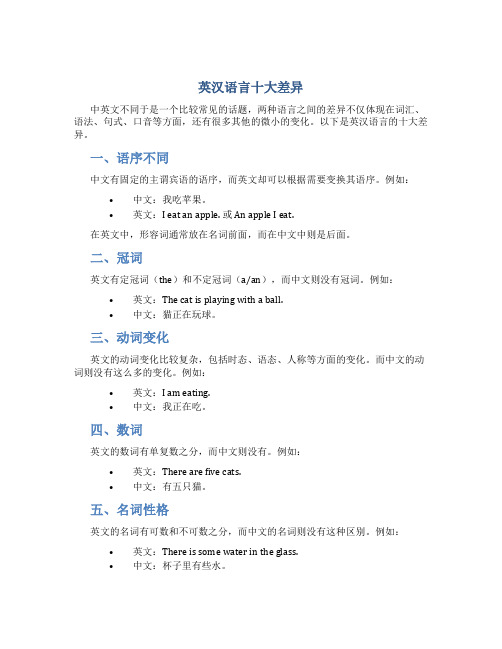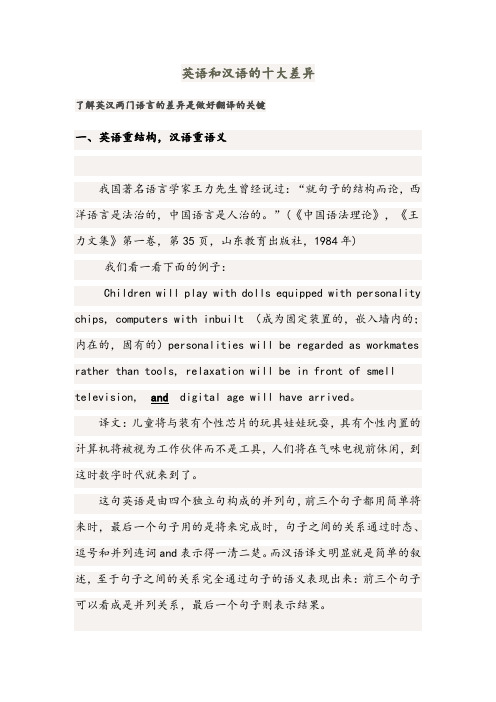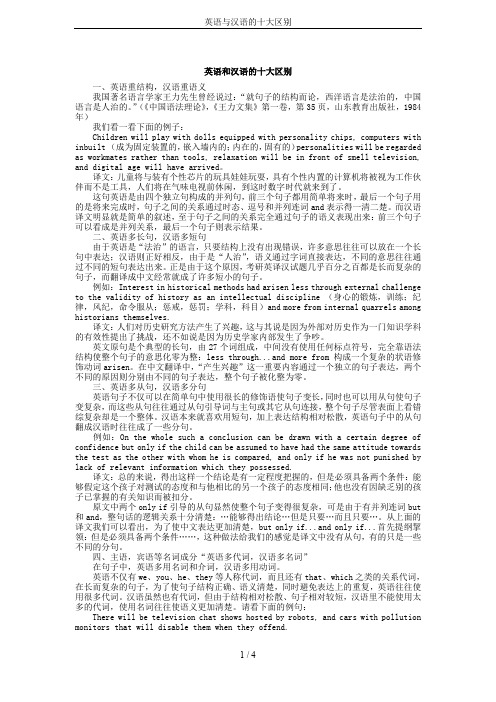汉语英语十大差异
英汉语言差异

英汉语言的差异一、英语重形合,汉语重意合二、英语句长复杂,汉语句短简练三、英语多被动语态,汉语多主动语态四、英语重心在前,汉语重心在后五、英语注重省略,汉语注重补充六、英语多抽象词,汉语多具体词七、英语多替换,汉语多重复八、英语多代词,汉语多名词九、英语结构紧凑,汉语结构松散十一、英语好静,汉语好动十二、英语重物,汉语重人就整体结构和表达方式而言,英语是一种形合性的语言,而汉语则是一种意合性的语言。
英语的句子一般是按照固定的结构和方式来组织和表达的,偏重于形式;汉语的句子则是按照其字词的含义来组合和连接的,表达方式灵活多变,偏重于语意。
英语句子之间的关系可以通过时态、标点符号、连接词等表示得一清二楚;而汉语句子之间的关系则要靠句子本身的语意来表现。
【例 1】 Another attempt, and you'll succeed.【译文】再试一次,你就会成功。
/ 只要再试一次,你就会成功。
【分析】本句是一个由and 连接的简单并列句,一般将来时态明确表明了两句间的动作关系。
但汉语译文就比较灵活,句子之间的关系主要靠语意来表达,关联词可译(括号内译文)也可不译,习惯于不译。
【例 2】When a representative exceeds his allottedtime, the President shall callhimto order without delay.【译文】 (翻译腔)当一位代表超过他的分配时间,主席将告诉他命令,不要推迟。
(改进)(如果)代表发言超过规定时间,主席应督促他遵守规则。
【分析】该句是一个 when 引导的主从复合句,看似一个简单的 "主将从现"句,但却不能直译成汉语 (如第一句译文)。
When 从句其实表示一种假设,如果直译成当“… … 时候”,就没有表达出原句的逻辑关系; his 这样的形容词性物主代词翻译成中文时可以不译;shall 是个情态动词,不是将来时; order 是名词,表示规“则” ,不能硬译为命“令”。
英语与汉语的十大区别

英语与汉语的十大区别英语与汉语的十大区分一、英语重结构,汉语重语义我国闻名语言学家王力先生曾经说过:“就句子的结构而论,西洋语言是法治的,中国语言是人治的。
”(《中国语法理论》,《王力文集》第一卷,第35页,山东教导出版社,1984年)我们看一看下面的例子:Children will play with dolls equipped with personality chips, computers with inbuilt (成为固定装置的,嵌入墙内的;内在的,固有的)personalities will be regarded as workmates rather than tools, relaxation will be in front of smell television, and digital age will have arrived。
译文:儿童将与装有共性芯片的玩具娃娃戏耍,具有共性内置的计算机将被视为工作伙伴而不是工具,人们将在气味电视前休闲,到这时数字时代就来到了。
这句英语是由四个自立句构成的并列句,前三个句子都用容易未来时,最后一个句子用的是未来完成时,句子之间的关系通过时态、逗号和并列连词and表示得一清二楚。
而汉语译文显然就是容易的讲述,至于句子之间的关系彻低通过句子的语义表现出来:前三个句子可以看成是并列关系,最后一个句子则表示结果。
二、英语多长句,汉语多短句因为英语是"法治"的语言,只要结构上没有浮现错误,许多意思往往可以放在一个长句中表达;汉语则正巧相反,因为是"人治",语义通过字词直接表达,不同的意思往往通过不同的短句表达出来。
正是因为这个缘由,考研英译汉试题几乎百分之百都是长而复杂的句子,而翻译成中文常常就成了许多短小的句子。
例如:Interest in historical methods had arisen less through external challenge to the validity of history as an intellectual discipline (身心的熬炼,训练;纪律,风纪,命令听从;惩戒,惩处;学科,科目)and more from internal quarrels among historians themselves.译文:人们对历史讨论办法产生了爱好,这与其说是由于外部对历史作为一门学问学科的有效性提出了挑战,还不如说是由于历史学家内部发生了争执。
汉语英语十大差异

once traveling in China. • 那太阳,整天躲在云层里,现在又光芒四射了. • The sun, which had hidden all day, now came out in
9
Exceltek Electronics (HK) Ltd Confidential
英语:静态语言;汉语:动态语言
• 我疯狂地爱上了她,她也疯狂地爱上了我. • I fell madly in love with her, and she with me.(英语
可省略后半句的动词,汉语却不可.) • 他来回晃着脑袋,欲望在膨胀,意志在萎缩. • Back and forth his head swiveled, desire waxing,
country, if only they dare to rise in struggle, dare to take up arms and grasp in their own hands the destiny of their own country. (先“断言” 后“条件”)
6
Exceltek Electronics (HK) Ltd Confidential
3.英语:静态语言;汉语:动态语言
• 英语有少用(谓语)动词,或使用其他手段表示动作 意义的自然倾向;而汉语则有动辄使用动词的固有 习惯.
• 英语静态特征的表现主要有句法方式或词汇方式 两种.前者如使用非谓语或非限定动词,省略动词以 及将动词名词化等;后者如使用动词的同源名词,同 源形容词,介词及副词等.相对而言,汉语的动词由 于无英语动词那样的形态变化,若要表达动作意义, 往往别无他法,只能起用动词本身.
英语和汉语的十大区别精编版

英语和汉语的十大区别一、英语重结构,汉语重语义我国著名语言学家王力先生曾经说过:“就句子的结构而论,西洋语言是法治的,中国语言是人治的。
”(《中国语法理论》,《王力文集》第一卷,第35页,山东教育出版社,1984年)我们看一看下面的例子:Children will play with dolls equipped with personality chips, computers with inbuilt (成为固定装置的,嵌入墙内的;内在的,固有的)personalities will be regarded as workmates rather than tools, relaxation will be in front of smell television, and digital age will have arrived。
译文:儿童将与装有个性芯片的玩具娃娃玩耍,具有个性内置的计算机将被视为工作伙伴而不是工具,人们将在气味电视前休闲,到这时数字时代就来到了。
这句英语是由四个独立句构成的并列句,前三个句子都用简单将来时,最后一个句子用的是将来完成时,句子之间的关系通过时态、逗号和并列连词and表示得一清二楚。
而汉语译文明显就是简单的叙述,至于句子之间的关系完全通过句子的语义表现出来:前三个句子可以看成是并列关系,最后一个句子则表示结果。
二、英语多长句,汉语多短句由于英语是法治的语言,只要结构上没有出现错误,许多意思往往可以放在一个长句中表达;汉语则正好相反,由于是人治,语义通过字词直接表达,不同的意思往往通过不同的短句表达出来。
正是由于这个原因,考研英译汉试题几乎百分之百都是长而复杂的句子,而翻译成中文经常就成了许多短小的句子。
例如:Interest in historical methods had arisen less through external challenge to the validity of history as an intellectual discipline (身心的锻炼,训练;纪律,风纪,命令服从;惩戒,惩罚;学科,科目)and more from internal quarrels among historians themselves.译文:人们对历史研究方法产生了兴趣,这与其说是因为外部对历史作为一门知识学科的有效性提出了挑战,还不如说是因为历史学家内部发生了争吵。
英汉语言十大差异

英汉语言十大差异中英文不同于是一个比较常见的话题,两种语言之间的差异不仅体现在词汇、语法、句式、口音等方面,还有很多其他的微小的变化。
以下是英汉语言的十大差异。
一、语序不同中文有固定的主谓宾语的语序,而英文却可以根据需要变换其语序。
例如:•中文:我吃苹果。
•英文:I eat an apple. 或 An apple I eat.在英文中,形容词通常放在名词前面,而在中文中则是后面。
二、冠词英文有定冠词(the)和不定冠词(a/an),而中文则没有冠词。
例如:•英文:The cat is playing with a ball.•中文:猫正在玩球。
三、动词变化英文的动词变化比较复杂,包括时态、语态、人称等方面的变化。
而中文的动词则没有这么多的变化。
例如:•英文:I am eating.•中文:我正在吃。
四、数词英文的数词有单复数之分,而中文则没有。
例如:•英文:There are five cats.•中文:有五只猫。
五、名词性格英文的名词有可数和不可数之分,而中文的名词则没有这种区别。
例如:•英文:There is some water in the glass.•中文:杯子里有些水。
六、代词英文的代词种类较多,包括主、宾、物主等。
而中文的代词比较简单。
例如:•英文:He gave me his book.•中文:他把他的书给了我。
七、词汇用法两种语言的词汇用法也有所不同。
例如:•英文:He is interested in music.•中文:他对音乐很感兴趣。
八、语气两种语言的语气表达方式也有一些差异。
例如:•英文:Could you help me, please?•中文:请你能帮助我吗?九、拟声词中文的拟声词较多,而英文则相对较少。
例如:•中文:咕咚(水声)•英文:drip(滴水声)十、表达感情中文在表达感情时比较直白,而英文则更为委婉。
例如:•中文:我爱你。
•英文:I love you. 或者 I adore you.总的来说,中英文之间有很多差异,这些差异反映了不同文化的不同特点。
英语和汉语的十大差异

英语和汉语的十大差异了解英汉两门语言的差异是做好翻译的关键一、英语重结构,汉语重语义我国著名语言学家王力先生曾经说过:“就句子的结构而论,西洋语言是法治的,中国语言是人治的。
”(《中国语法理论》,《王力文集》第一卷,第35页,山东教育出版社,1984年)我们看一看下面的例子:Children will play with dolls equipped with personality chips, computers with inbuilt (成为固定装置的,嵌入墙内的;内在的,固有的)personalities will be regarded as workmates rather than tools, relaxation will be in front of smell television, and digital age will have arrived。
译文:儿童将与装有个性芯片的玩具娃娃玩耍,具有个性内置的计算机将被视为工作伙伴而不是工具,人们将在气味电视前休闲,到这时数字时代就来到了。
这句英语是由四个独立句构成的并列句,前三个句子都用简单将来时,最后一个句子用的是将来完成时,句子之间的关系通过时态、逗号和并列连词and表示得一清二楚。
而汉语译文明显就是简单的叙述,至于句子之间的关系完全通过句子的语义表现出来:前三个句子可以看成是并列关系,最后一个句子则表示结果。
二、英语多长句,汉语多短句由于英语是"法治"的语言,只要结构上没有出现错误,许多意思往往可以放在一个长句中表达;汉语则正好相反,由于是"人治",语义通过字词直接表达,不同的意思往往通过不同的短句表达出来。
正是由于这个原因,考研英译汉试题几乎百分之百都是长而复杂的句子,而翻译成中文经常就成了许多短小的句子。
例如:Interest in historical methods had arisen less through external challenge to the validity of history as an intellectual discipline (身心的锻炼,训练;纪律,风纪,命令服从;惩戒,惩罚;学科,科目)and more from internal quarrels among historians themselves.译文:人们对历史研究方法产生了兴趣,这与其说是因为外部对历史作为一门知识学科的有效性提出了挑战,还不如说是因为历史学家内部发生了争吵。
英汉文化的十大常见差异

英汉文化的十大常见差异在开放的现代社会,跨文化的言语交际显得愈发重要,已经成为现代交际中引人注目的一个特点。
交际中的文化差异随处可见,言语环境中的文化因素受到普遍重视。
下面是英汉文化中十大常见差异。
1.回答提问中国人对别人的问话,总是以肯定或否定对方的话来确定用“对”或者“不对”。
如:“我想你不到20岁,对吗?”“是的,我不到20岁。
”(“不,我已经30岁了。
”)英语中,对别人的问话,总是依据事实结果的肯定或否定用“Yes”或者“No”。
如:“You're not a student,are you?”“Yes,I am.”(“No,I am not.”)2.亲属称谓英语的亲属以家庭为中心,一代人为一个称谓板块,只区别男性、女性,却忽视配偶双方因性别不同而出现的称谓差异。
显得男女平等。
如:英文“grandparents,grandfather,grandmother”,而中文“祖辈、爷爷、奶奶、外公、外婆”。
再如,父母同辈中的称谓:英文“uncle”和“aunt”,而中文“伯伯、叔叔、舅舅等,姑妈、姨妈等”。
还有,英文中的表示下辈的“nephew和niece”是不分侄甥的,表示同辈的“cousin”不分堂表、性别。
3.考虑问题的主体中国人喜欢以对方为中心,考虑对方的情感。
比如:你想买什么?您想借什么书?而英语中,往往从自身的角度出发。
如:Can I help you?What can I do for you?4.问候用语中国人打招呼,一般都以对方处境或动向为思维出发点。
如:您去哪里?您是上班还是下班?而西方人往往认为这些纯属个人私事,不能随便问。
所以他们见面打招呼总是说:Hi/Hello!Good morning/afternoon/evening/night!How are you?It's a lovely day,isn't it?5.面对恭维中国人的传统美德是谦虚谨慎,对别人的恭维和夸奖应是推辞。
汉语英语十大差异 PPT课件

7.英语重后饰;汉语重前饰.
汉语句子的语序一般以思维程 序展开,而中国人的思维方式多 是先考虑事物的环境和外围因 素,再考虑具体事物和中心事件. 反映到句式上,就是状语总放在 谓语或句子主体的前边,定语无 论长短,都要置于中心词之前.这 样就使得单句的状语部分长,主 谓部分短;主语部分长,谓语部分 短;修饰成分长,中心词短.整体上 形成头大尾小的狮子头形状.
英汉十大差异
Differences between Chinese and English
What are the differences between Chinese and English?
2
Etymology English --- Indo-European Family Chinese --- Sino-Tibetan Family
13
5.英语多被动;汉语多主动
An illustration is furnished by an editorial in the Washington Post.
《华盛顿邮报》的一篇社论提供了一个例证。 It has been known for a long time that there
laugh.
12
5.英语多被动;汉语多主动
Passive voice is often available in English because of inanimate words as subjects.
Correspondingly, active voice is often available in Chinese because of animate words as subjects.
英汉句子的重心,就逻辑而言,一般均落在结论,断言,结果以及事实上, 但细究之下,其”异在于重心的位置所在,即 “英前汉后”.
英汉十大差异

7.英语:重后饰(back modifier);汉语:重前饰 英语:重后饰 英语 ;汉语: (preceding modifier)
英语与汉语就句子的逻辑重心而言,前者惯于前置, 先声” 英语与汉语就句子的逻辑重心而言,前者惯于前置,“先声” 夺人;后者善于后移, 后发”制人。但以“语序” 夺人;后者善于后移,“后发”制人。但以“语序”观,两者 通常都采用“主谓宾” 的线性排列顺序。 通常都采用“主谓宾”(SVO)的线性排列顺序。具体而言,英 的线性排列顺序 具体而言, 语的修饰语既可以前置,又可后置,但修饰语若为短语或分句, 语的修饰语既可以前置,又可后置,但修饰语若为短语或分句, 则往往后置。汉语的修饰语无论是词、短语或句子,总是前置。 则往往后置。汉语的修饰语无论是词、短语或句子,总是前置。 英语以“尾重”为美,而这种“美”多半依靠“重后饰”的表 英语以“尾重”为美,而这种“ 多半依靠“重后饰” 达习惯铸成。 达习惯铸成。
玛丽正在考虑调换工作。 玛丽正在考虑调换工作。
9.英语:重时体;汉语:轻时体 英语:重时体;汉语: 英语
英语有16个时态;而汉语动词除了只有“ 英语有 个时态;而汉语动词除了只有“着”、“了”、 个时态 与英语的进行时、完成时或过去时相比之外, “过”与英语的进行时、完成时或过去时相比之外,别无其 他与英语对应的时体方式。 他与英语对应的时体方式。 英语可以通过固定的语法手段将动作的进行过程与状态作更 准确、更精细的描绘。 准确、更精细的描绘。有时这种描绘还能融入作者或说话人 的一种感情色彩。 的一种感情色彩。 He is always thinking of how he could do more for the people. 他总是考虑如何为人民做更多的事。 他总是考虑如何为人民做更多的事。 赞扬
(完整word版)英汉语言十大差异

英汉语言十大差异语言毕竟是文化的载体,语言与文化,甚至历史、地理、风俗、政治、经济等常常水乳交融,它们无孔不入地反作用于语言,使语言打上深深的文化烙印。
英汉翻译者,若不知英汉各自的特点,不知两者的差异,是不能想象的。
不要以为,汉语是我们的母语,从牙牙学语开始,便开始接触汉语,因此,就想象自己很了解汉语。
其实,这是一种误解。
汉语到底有什么特点? 就汉语论汉语,因为没有距离,就看不真切,因为没有比较,就看不明白!只有当汉语和英语比肩而立,碰撞交流,才会燃爆出绚丽的火花,两者之差异,才会赫然呈现。
目前,从事英汉对比研究的学者和专著在我国并不少,但是,当我们放眼这个领域,就觉得有必要正面回答一个问题:英汉对比研究的目的是什么?弄明白英汉的差异,并不是我们研究的最终目标,至多只能是一种手段而已,而手段总得服务于一定的目的。
英汉对比研究的一个重要的目的应该是:服务于翻译。
译界的实践证明:只有对英汉之差异了然于心,译者才能做到下笔如有神。
下面结合英汉翻译的实际,对英汉之间的明显差异作鸟瞰式分析和归纳。
1.英语重形合(Hypotaxis),汉语重意合(Parataxis)汉语重意合,结构松弛,多以意思连接的积累式分句(Accumulative Clause)或独立的单句(independent Sentence),其彼此的逻辑关系多以句序之先后加以暗示。
有的语言学家以“竹节句法”写英句,所谓“竹节”,则指其断不可缺的种种连接词(Connectives);有以“流水句法”写汉句,所谓“流水”,指少用乃至不用连接词的行文流畅。
美国的翻译学家Eugene A.Nida在其Translating Meanings (1983)一书中曾经深入浅出地说明了英汉这一差异:就汉语和英语而言,也许在语言学上最重要的一个区别就是形合和意合的对比,在英语以及大多数的印欧语言中,句子的从属关系大多是用连接词如,although,because,when,in order that,so及so that等词明确地表达出来。
英语与汉语的十大区别

英语和汉语的十大区别一、英语重结构,汉语重语义我国著名语言学家王力先生曾经说过:“就句子的结构而论,西洋语言是法治的,中国语言是人治的。
”(《中国语法理论》,《王力文集》第一卷,第35页,山东教育出版社,1984年)我们看一看下面的例子:Children will play with dolls equipped with personality chips, computers with inbuilt (成为固定装置的,嵌入墙内的;内在的,固有的)personalities will be regarded as workmates rather than tools, relaxation will be in front of smell television, and digital age will have arrived。
译文:儿童将与装有个性芯片的玩具娃娃玩耍,具有个性内置的计算机将被视为工作伙伴而不是工具,人们将在气味电视前休闲,到这时数字时代就来到了。
这句英语是由四个独立句构成的并列句,前三个句子都用简单将来时,最后一个句子用的是将来完成时,句子之间的关系通过时态、逗号和并列连词and表示得一清二楚。
而汉语译文明显就是简单的叙述,至于句子之间的关系完全通过句子的语义表现出来:前三个句子可以看成是并列关系,最后一个句子则表示结果。
二、英语多长句,汉语多短句由于英语是“法治”的语言,只要结构上没有出现错误,许多意思往往可以放在一个长句中表达;汉语则正好相反,由于是“人治”,语义通过字词直接表达,不同的意思往往通过不同的短句表达出来。
正是由于这个原因,考研英译汉试题几乎百分之百都是长而复杂的句子,而翻译成中文经常就成了许多短小的句子。
例如:Interest in historical methods had arisen less through external challenge to the validity of history as an intellectual discipline (身心的锻炼,训练;纪律,风纪,命令服从;惩戒,惩罚;学科,科目)and more from internal quarrels among historians themselves.译文:人们对历史研究方法产生了兴趣,这与其说是因为外部对历史作为一门知识学科的有效性提出了挑战,还不如说是因为历史学家内部发生了争吵。
英语汉语十大差异

英汉系统对比十大差异1. 英语重形合,汉语重意合。
He bought one suit for the coming prom which cost him $500.为了即将举行的舞会,他买了套礼服,花了500美元。
2.英语多静态,汉语多动态。
Americans are great joiners, as the huge number of organizations available in the United States attests.美国各种组织的数目之庞大足以证明美国人热衷参与活动。
3.英语重物称,汉语重人称。
It occurred to me this morning that saying "bless you" after someone sneezes is a pretty weird cultural artifact.今天早上我想起大家在他人打喷嚏之后要说“保佑你”,真是十分怪异的文化习俗。
4. 英语多代词,汉语多名词。
Dare and the world always yields. lf it beats you sometimes, dare it again and again and it will succumb.——W.M. Thackeray. British novelist大胆挑战,世界总会让步。
如果有时候你被它打败了,不断地挑战,它总会屈服的。
——英国小说家萨克雷·W.M5.英语多被动,汉语多主动。
Long dominated by the Japanese, Asia’s auto market now lies in the sights of ambitious US and European car manufacturers.亚洲汽车市场在经历了日本长期统治之后,如今正对美国和欧洲的汽车制造商虎视眈眈。
英汉十大差异PPT课件

• 小国人民敢于起来斗争,敢于拿起武器,掌握自己国家的命运, 就一定能够战胜大国的侵略.
• 本句所用句式为:条件---断言,即”如果怎样,结果就怎样”.前 者”条件”为轻,后者”断言”为重.其相应英语表达为:
• 这位饱尝辛酸者,却让全世界的人发出笑声.
• Bitterness fed on the man who had made the
5.英语多被动;汉语多主动
• 在什么情况下汉语的主动句转译成英语的被动句. • 1)强调受事,突出被动状态. • 地球上早期的火是大自然而不是人类引燃的.
• Early fires on the earth were caused by nature, not by man. • 2)因种种原因,不出现或无须说明施事者. • 这种书是给儿童写的.
• 一看见他,我就紧张.
• The very sight of him makes me nervous.
• 对此我深信不疑.
• I’m sure of it.
4.英语重物称;汉语重人称.
• 英语的物称倾向十分明显,主要见于其对主语的择 定.英语常选择不能施行动作或无生命事物的词语 作主语.相对而言,汉语一般则更习惯于人称化的表 达,尤其是主语,能施行动作或有生命物体为主语首 选.试比较:
英语:静态语言;汉语:动态语 言• 我疯狂地爱上了她,她也疯狂地爱上了我.
• I fell madly in love with her, and she with me.(英语可省略后半句的动词,汉语却不可.)
英汉十大差异

•
The people of a small country can certainly defeat aggression by a big country, if only they dare to rise in struggle, dare to take up arms and grasp in their own hands the destiny of their own country. 译文 小国人民敢于起来斗争,敢于拿起武器, 掌握自己国家的命运,就一定能够战胜大国 的侵略。 • 揭穿这种老八股、老教条的丑态给人民看, 号召人民起来反对老八股、老教条,这就是 五四运动时期的一个极大的功绩。 译文 A A tremendous achievement of the May 4th Movement was its public exposure of the ugliness of old stereotype and the old dogma and its call to the people to rise against them.
译文 我们就住在路边。过路人和外乡人常到 我们家,尝尝我们家酿的酸果酒。这种酒很 有名气。我敢说,尝过的人,从没有挑剔过。 我这话像历史学家说的话一样靠的住。 7. 英语重后饰;汉语重前饰 • The diagnosis seems in every case to correspond exactly with all the sensations that I
• It may be… a low-lying arid stretch with miles of white sandy beach, and no sign of people, very bleached and barren. 译文 那可能是……低洼、连绵数英里、人迹
- 1、下载文档前请自行甄别文档内容的完整性,平台不提供额外的编辑、内容补充、找答案等附加服务。
- 2、"仅部分预览"的文档,不可在线预览部分如存在完整性等问题,可反馈申请退款(可完整预览的文档不适用该条件!)。
- 3、如文档侵犯您的权益,请联系客服反馈,我们会尽快为您处理(人工客服工作时间:9:00-18:30)。
Differences between Chinese and English
What are the differences between Chinese and English?
2
Etymology
English
--- Indo-European Family Chinese --- Sino-Tibetan Family
12
5.英语多被动;汉语多主动
Passive voice is often available in English because of inanimate words as subjects. Correspondingly, active voice is often available in Chinese because of animate words as subjects.
13
5.英语多被动;汉语多主动 An illustration is furnished by an editorial in the Washington Post. 《华盛顿邮报》的一篇社论提供了一个例证。 It has been known for a long time that there is a first relationship between the heart and the liver. 心与肝的密切关系是早为人知的了。
10
英语:静态语言;汉语:动态语言
That would be the confirmation that it was in general use. (confirm同根名词) 除上述同源词外,还有众多的词可用来表示动作 意义.如:glance, glimpse, look, mention, close 等;形容词able, afraid, angry, anxious, aware, capable, good等.在特定的语言环境中,这些词 都宜译作相应的动词.如: 一看见他,我就紧张. The very sight of him makes me nervous. 对此我深信不疑. I’m sure of it.
5
2.英语:前重心;汉语:后重心
英汉句子的重心,就逻辑而言,一般均落在结论,断言,结果以及事实上, 但细究之下,其”异在于重心的位置所在,即 “英前汉后”. 生活中既有悲剧,文学作品就可以写悲剧. 这是一个 “因果”句,汉语一般是先因后果.如此排列可见“因”轻 “果”重.相应的英语表达是: Tragedies can be written in literature since there is tragedy in life.(先果后因) 小国人民敢于起来斗争,敢于拿起武器,掌握自己国家的命运,就一定 能够战胜大国的侵略. 本句所用句式为:条件---断言,即”如果怎样,结果就怎样”.前者”条 件”为轻,后者”断言”为重.其相应英语表达为: The people of a small country can certainly defeat aggression by a big country, if only they dare to rise in struggle, dare to take up arms and grasp in their own hands the destiny of their own country. (先“断言”后“条件”)
11
4.英语重物称;汉语重人称.
英语的物称倾向十分明显,主要见于其对主语的择定.英 语常选择不能施行动作或无生命事物的词语作主语.相 对而言,汉语一般则更习惯于人称化的表达,尤其是主语, 能施行动作或有生命物体为主语首选.试比较: 他进门时带进一缕雪茄烟雾. A wave of cigar smoke accompanied him in. “嗨! 嗨!”出租车司机嚷道,他一瞅见旅客就 “砰”地 打开车门. “Hi! Hi!” said the cab driver, the door of whose cab popped open at the very sight of a traveler. 这位饱尝辛酸者,却让全世界的人发出笑声. Bitterness fed on the man who had made the world laugh.
4
英语重形合,汉语重意合.
他不去我去. I’d like to go if he wouldn’t. 他不去我也去. I’d go there even if he wouldn’t to with me. 他不去我才去. I’d go there only if he won’t. 人穷志短 When a man is poor his ambition is not far-reaching. (Poverty stifles ambition.) 人穷志不短. Though one is poor, he has high apiration. 人有脸,树有皮. The face is as important to a man as the bark to a tree.
16
5.英语多被动;汉语多主动
5)使语气委婉,措辞礼貌. 今天晚上七点钟开教学会,全体教师务必 参加. There will be a Teaching Symposium at 7:00p.m. today. All the faculty is expected to attend. 请您不要在此抽烟. You are not supposed to smoke in here.
8
英语:静态语言;汉语:动态语言
因为距离远,交通工具缺乏,使农村社
会与外界隔绝。这种隔绝,又由于通讯 工具不足,而变得更加严重。 回译 Because there is a great distance and there are not enough transport facilities, the rural world is isolated. This isolation has become more serious because there are not enough information media.
6
3.英语:静态语言;汉语:动态语言
英语有少用(谓语)动词,或使用其他手段表示动 作意义的自然倾向;而汉语则有动辄使用动词的 固有习惯. 英语静态特征的表现主要有句法方式或词汇方 式两种.前者如使用非谓语或非限定动词,省略动 词以及将动词名词化等;后者如使用动词的同源 名词,同源形容词,介词及副词等.相对而言,汉语 的动词由于无英语动词那样的形态变化,若要表 达动作意义,往往别无他法,只能起用动词本身.
3
1.英语重形合,汉语重意合.
跑得了和尚,跑不了庙. The monks may run away, but the temple cannot run away with him. 一个英国人,不会说中国话,有一次在中国旅行. An Englishman who could not speak Chinese was once traveling in China. 那太阳,整天躲在云层里,现在又光芒四射了. The sun, which had hidden all day, now came out in full splendor.
14
5.英语多被动;汉语多主动
在什么情况下汉语的主动句转译成英语的被动 句. 1)强调受事,突出被动状态. 地球上早期的火是大自然而不是人类引燃的. Early fires on the earth were caused by nature, not by man. 2)因种种原因,不出现或无须说明施事者. 这种书是给儿童写的. Such books are written for children.
7
英语:静态语言;汉语:动态语言
The
isolation of the rural world because of distance and the lack of transport facilities is compounded by the paucity of the information media. 9 nouns,5 preps,1 verb
17
5.英语多被动;汉语多主动
6)某些汉语句子可借助于英语的一些固定搭配 或词组来表达. 他坚持不懈地从事着科研工作. He was engaged in scientific researches perseveringly. He persevered in scientific researches. 7)汉语中含有被动意义的主动句. 病人正在手术中. The patient is being operated on. 这个问题必须马上解决. This problem has to be solved immediately.
15
5.英语多被动;汉语多主动
ቤተ መጻሕፍቲ ባይዱ
3)使句子结构匀称,文气连贯. 他出现在台上,群众报以热烈的掌声. He appeared on the stage and was warmly applauded by the audience. 4)汉语中的某些习惯用语或泛指人称为主语的 主动句. 大家都认为这样做是不妥当的. It is generally considered not advisable to act that way. 有人给你打电话. You are wanted on the phone.
18
Grapes vs. Bamboo
